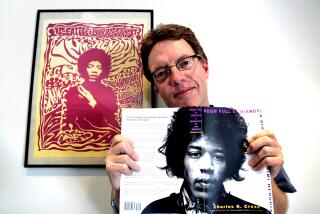Harry McPherson Jr. dies at 82; LBJ’s top speechwriter
Harry C. McPherson Jr., who served as special counsel and chief speechwriter for President Lyndon Johnson from 1966 to ’69 and was a valued advisor to the president on civil rights, the Vietnam War and other policy issues, has died. He was 82.
McPherson, who later became a prominent Washington lawyer and lobbyist, died Feb. 16 of complications of cancer at Suburban Hospital in Bethesda, Md., said Hedrick Smith, a family friend.
“Harry McPherson was a ‘can do’ man with sound judgment and treasured loyalty who could be counted on by generations of Johnsons,” Luci Baines Johnson, the president’s youngest daughter, said in a statement.
The Texas-born McPherson was a recent graduate of the University of Texas School of Law when he drove his old Buick to Washington in 1956 to begin working as assistant general counsel for the Democratic Policy Committee chaired by fellow Texan Johnson, then the Senate majority leader.
McPherson, who served as the committee’s general counsel from 1961 to ‘63, was deputy undersecretary of the Army for International Affairs and assistant secretary of State for Educational and Cultural Affairs before moving over to the White House as understudy to White House special counsel Lee White in 1965.
A year later, McPherson became special counsel to the president.
Beginning that summer, he “crafted all of the president’s major addresses,” Robert Dallek wrote in his 1998 Johnson biography “Flawed Giant,” describing McPherson as an “evocative writer with a keen feel for Johnson’s style of speaking and desire for terse, spare prose that included ‘a little poetry’ and some alliteration.”
“The president valued his advice,” said Mark Updegrove, director of the Lyndon Baines Johnson Library & Museum, who interviewed McPherson for his book “Indomitable Will: LBJ in the Presidency,” to be published in March.
“When you consider the turbulent times President Johnson was in the White House, that advice becomes even more important,” Updegrove said. “He could speak very frankly to LBJ about the war, which was a sensitive subject.”
In his 1972 book “A Political Education: A Washington Memoir,” McPherson vividly described the extent to which the Vietnam War occupied the Johnson White House.
“Vietnam,” he wrote, “became a second consciousness.… One thought of friends, and Vietnam; raising a family, and Vietnam; investing in the market, writing a letter, visiting a university, watching television, and Vietnam.
“Like an acid, it was eating into everything. It threatened to wipe out public awareness of Johnson’s great achievements.”
McPherson later recalled hearing Vietnam War protesters in Lafayette Park near the White House chanting, “Hey, hey, LBJ. How many kids did you kill today?” when he and the president’s domestic affairs advisor, Joseph A. Califano Jr., were having lunch with Johnson in the Rose Garden in March 1968.
At one point, McPherson recalled in 2006, he and Califano were stunned but not entirely surprised when the president told them, “I may not run for reelection.”
McPherson wrote the first part of the landmark televised speech Johnson delivered March 31, 1968, when — in an effort to get talks started on a settlement of the war — he announced a halt in the bombing of almost all of North Vietnam.
In a new ending to the speech that Johnson had worked on with speechwriter Horace Busby, the president stunned the nation by saying, “I shall not seek, and I will not accept, the nomination of my party for another term as your president.”
In a 1999 interview with the law publication Bar Reports, McPherson described Johnson as “still the smartest man I’ve ever met, although maybe not the wisest. He more or less threw in the towel.… When it was finally over, and he left the White House, I was exhausted.
“I saw him off on inauguration day as he left Washington. As I watched him get on the plane, I felt officially powerless, and oddly, relieved.”
After leaving the White House, McPherson became a partner in a Washington law firm known for its successful lobbying efforts. He retired in 2010.
He also served on a number of presidential commissions, including one in 1979 to investigate the nuclear accident at Three Mile Island. McPherson also had been president of the influential Federal City Council in Washington and vice chairman and general counsel of theJohn F. Kennedy Center for the Performing Arts.
Born in Tyler, Texas, on Aug. 22, 1929, McPherson earned a bachelor’s degree in 1949 in English from the University of the South in Sewanee, Tenn. He did graduate work in English literature at Columbia University before serving in the Air Force from 1950 to 1953 as an air target intelligence officer in Germany.
McPherson is survived by his wife, Patricia; their son Samuel; and two children from his first marriage, Coco and Peter.
More to Read
Start your day right
Sign up for Essential California for the L.A. Times biggest news, features and recommendations in your inbox six days a week.
You may occasionally receive promotional content from the Los Angeles Times.



















































